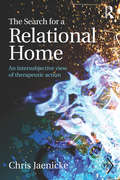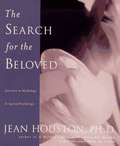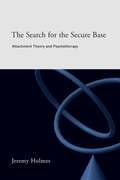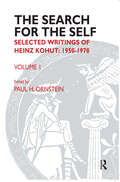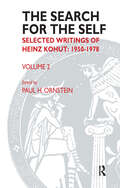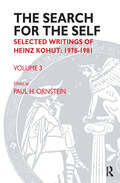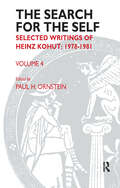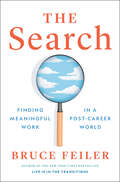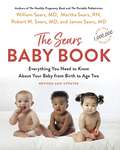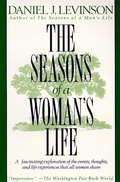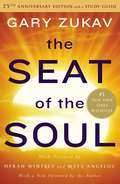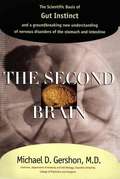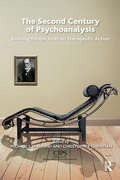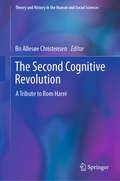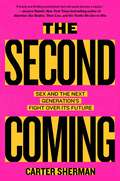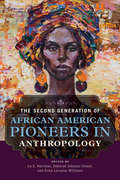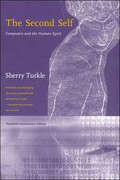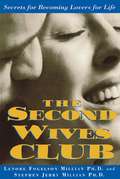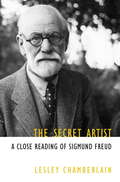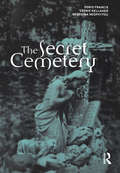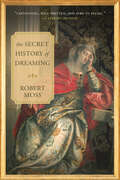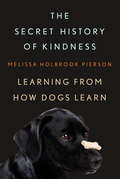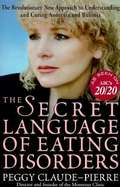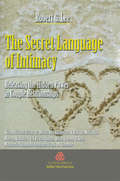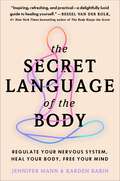- Table View
- List View
The Search for a Relational Home: An intersubjective view of therapeutic action (Psychoanalytic Inquiry Book Series)
by Chris JaenickeIn The Search for a Relational Home, Chris Jaenicke gives the reader an inside view of what actually happens in psychotherapy and how change occurs. He describes how both participants – the patient and the therapist – feel, and how they affect each other. The reader is encouraged to vicariously partake in the process from the perspective of his or her own life experiences. The book describes the nature of therapeutic action through a radicalized version of intersubjective systems theory. It demonstrates how psychotherapy is an outcome of a highly personal encounter between two unique human beings, and how, while the goal of psychoanalysis is to help the patient, this can only be achieved inasmuch as both participants are willing to undergo transformation. Jaenicke clarifies how both successes and failures as well as personal strengths and weaknesses play a constitutive part in the psychotherapeutic process. The Search for a Relational Home also provides theoretical and practical guidelines for supervision. Jaenicke presents here a unique approach to the process of psychotherapy which will be vital reading for psychoanalysts, psychotherapists and those in training as well as students in all fields of mental health.
The Search for the Beloved: Journeys in Mythology and Sacred Psychology
by Jean HoustonIt's one of the most important books written on the creative and inventive mind, explains the theories that helped form the foundation of the human potential movement. In what has been called “an intellectual and spiritual feast.
The Search for the Secure Base: Attachment Theory and Psychotherapy
by Jeremy HolmesIn recent decades, attachment theory has gained widespread interest and acceptance, although the relevance of attachment theory to clinical practice has never been clear. The Search for the Secure Base shows how attachment theory can be used therapeutically. Jeremy Holmes introduces an exciting new attachment paradigm in psychotherapy with adults, describing the principles and practice of attachment-informed therapy in a way that will be useful to beginners and experienced therapists alike. Illustrated with a wide range of clinical examples, this book will be welcomed by practitioners and trainees in psychotherapy, psychoanalysis and in many other disciplines.
The Search for the Self: Selected Writings of Heinz Kohut 1950-1978 (Search for the Self)
by Heinz Kohut'The re-issuing of the four volumes of the author's writings is a major publishing event for psychoanalysts who are interested in both the theoretical and the therapeutic aspects of psychoanalysis. These volumes contain the author's pre-self psychology essays as well as those he wrote in order to continue to expand on his groundbreaking ideas, which he presented in The Analysis of the Self; the Restoration of the Self; and in How Does Analysis Cure? These volumes of The Search for the Self permit the reader to understand not only the above three basic texts of psychoanalytic self psychology more profoundly, but also to appreciate the author's sustained openness to further changes - to dare to present his self psychology as in continued flux, influenced by newly emerging empirical data of actual clinical practice. The current re-issue of the four volumes of The Search for the Self would assure that the younger generation of psychoanalysts would be exposed to a clinical theory that could contribute greatly to solving the therapeutic dilemmas facing psychoanalysis today'. This is Volume one.
The Search for the Self: Selected Writings of Heinz Kohut 1978-1981 (Search for the Self)
by Heinz Kohut'The re-issuing of the four volumes of the author's writings is a major publishing event for psychoanalysts who are interested in both the theoretical and the therapeutic aspects of psychoanalysis. These volumes contain the author's pre-self psychology essays as well as those he wrote in order to continue to expand on his groundbreaking ideas, which he presented in The Analysis of the Self; the Restoration of the Self; and in How Does Analysis Cure? These volumes of The Search for the Self permit the reader to understand not only the above three basic texts of psychoanalytic self psychology more profoundly, but also to appreciate the author's sustained openness to further changes - to dare to present his self psychology as in continued flux, influenced by newly emerging empirical data of actual clinical practice.The current re-issue of the four volumes of The Search for the Self would assure that the younger generation of psychoanalysts would be exposed to a clinical theory that could contribute greatly to solving the therapeutic dilemmas facing psychoanalysis today'
The Search for the Self: Selected Writings of Heinz Kohut 1978-1981 (Search for the Self)
by Heinz Kohut'The re-issuing of the four volumes of the author's writings is a major publishing event for psychoanalysts who are interested in both the theoretical and the therapeutic aspects of psychoanalysis. These volumes contain the author's pre-self psychology essays as well as those he wrote in order to continue to expand on his groundbreaking ideas, which he presented in The Analysis of the Self; the Restoration of the Self; and in How Does Analysis Cure?These volumes of The Search for the Self permit the reader to understand not only the above three basic texts of psychoanalytic self psychology more profoundly, but also to appreciate the author's sustained openness to further changes - to dare to present his self psychology as in continued flux, influenced by newly emerging empirical data of actual clinical practice. The current re-issue of the four volumes of The Search for the Self would assure that the younger generation of psychoanalysts would be exposed to a clinical theory that could contribute greatly to solving the therapeutic dilemmas facing psychoanalysis today'
The Search for the Self: Selected Writings of Heinz Kohut 1978-1981 (Search for the Self)
by Heinz KohutThe re-issuing of the four volumes of the author's writings is a major publishing event for psychoanalysts who are interested in both the theoretical and the therapeutic aspects of psychoanalysis. These volumes contain the author's pre-self psychology essays as well as those he wrote in order to continue to expand on his groundbreaking ideas, which he presented in The Analysis of the Self; the Restoration of the Self; and in How Does Analysis Cure? These volumes of The Search for the Self permit the reader to understand not only the above three basic texts of psychoanalytic self psychology more profoundly, but also to appreciate Kohut's sustained openness to further changes - to dare to present his self psychology as in continued flux, influenced by newly emerging empirical data of actual clinical practice. The current re-issue of the four volumes of The Search for the Self would assure that the younger generation of psychoanalysts would be exposed to a clinical theory that could contribute greatly to solving the therapeutic dilemmas facing psychoanalysis today. This is volume four.
The Search: Finding Meaningful Work in a Post-Career World
by Bruce FeilerFind work you love. On your own terms. From the New York Times bestselling author of Life Is in the Transitions comes a bold new road map for finding meaning and purpose in what you do, based on insights drawn from hundreds of life stories of Americans of all backgrounds. America is at a once-in-a-generation turning point around work: unprecedented numbers are quitting their jobs, rethinking their routines, breaking away from stifling expectations. The most suffocating iron cage of all is the idea that each of us must follow a linear career—lock into a dream early, always climb higher, never stop until you reach the top. Few ideas have squandered more human potential. Employing his signature, immersive approach, Bruce Feiler is known for taking complex challenges and converting them into actionable steps that can help each of us live with more fulfillment and joy. From thousands of hours of interviews, Feiler has distilled a powerful new vision of work: The people who are happiest don&’t chase someone else&’s dreams; they chase their own. Freed from outdated scripts, they identify what brings them meaning and write their own story of success. The Search introduces an all-new toolkit for achieving that goal, 21 Questions to Find Work You Love. Practical and empowering, these questions will help you unearth the story of work you&’ve been trying to tell your whole life—then go achieve it. You&’ll discover: · The upsides and downsides of work you learned from your parents; · Why your childhood role model offers the best clue to what you should do now; · Who is your waymaker; · When to leave a job and when to stay; · What is your purpose right now; …and much more. From a master storyteller who&’s helped millions transform their lives for better, The Search arrives as the world reimagines the basic assumptions of work and offers a timely, urgent playbook for each of us to get the happiness we seek, the meaning we crave, and the success we deserve.
The Sears Baby Book: Everything You Need to Know About Your Baby from Birth to Age Two
by William Sears Martha Sears Robert W. Sears James SearsRevised and expanded: America's bestselling "baby bible" –– an encyclopedic guide to the first two years of your baby's life. The million-copy bestseller by &“the man who remade motherhood&” (TIME) has now been revised, expanded, and bought thoroughly up-to-date — with the latest information on prenatal vitamins, breastfeeding practices, daycare, midwifery, hospital births, preventing and overcoming postpartum depression, and infant development. The Searses draw from their vast experience both as medical professionals and parents to provide comprehensive information on virtually every aspect of infant care. The Sears Baby Book focuses on the essential needs of babies — eating, sleeping, development, health, and comfort — as it addresses the questions of greatest concern to today's parents. The topics covered include:Preparing for a safe and healthy birthBonding with your babyFeeding your baby Soothing your fussy babyGetting your baby to sleepUnderstanding your baby&’s developmentTreating common illnessesBabyproofing your homeUnderstanding toddler behaviorDealing with temper tantrumsToilet trainingWorking parentingFirst-aid proceduresand much moreUnrivaled in its scope and authority, The Sears Baby Book presents a practical, contemporary approach to parenting that reflects the way we live today. This is a rich and invaluable resource offering the basic guidance and inspiration you need to get the most out of parenting — for your child, yourself, and for your entire family.
The Seasons of a Woman's Life
by Daniel J. LevinsonFirmly grounded in scientific research, this book reveals that women follow a predictable developmental course through adulthood. Work and marriage relationships, personal crisis, emotional states, and behavior can all be related to this grand pattern. But in the case of women, the situation is made far more complicated by gender biases.From the Hardcover edition.
The Seat of the Soul: An Inspiring Vision Of Humanity's Spiritual Destiny
by Gary ZukavThe twenty-fifth anniversary of this beloved bestseller is celebrated in Prefaces by Oprah Winfrey and Maya Angelou and contains a new Foreword by the author, website links, and a new Study Guide to help readers find even deeper meaning and fulfillment.The Seat of the Soul encourages you become the authority in your own life. It will change the way you see the world, interact with other people, and understand your own actions and motivations. Beginning with evolution, Gary Zukav takes you on a penetrating exploration of the new phase humanity has entered: we are evolving from a species that understands power as the ability to manipulate and control--external power--into a species that understands power as the alignment of the personality with the soul--authentic power. Our evolution requires each of us to make the values of the soul our own: harmony, cooperation, sharing, and reverence for Life. Using his scientist's eye and philosopher's heart, Zukav shows us how to participate fully in this evolution, enlivening our everyday activities and all of our relationships with meaning and purpose. The Seat of the Soul has sold millions of copies around the globe, and as it changes lives, more and more people begin to live by the values of the spirit. Indeed, a new world is emerging, and this book brings its message to you.
The Second Brain
by Michael D. GershonThis book explains, in readable terms, what scientists now know about how the autonomic and the enteric nervous systems interact, what functions they perform, what causes such problems as ulcers and irritable bowel syndrome, and how scientists arrived at this knowledge.
The Second Century of Psychoanalysis: Evolving Perspectives on Therapeutic Action (CIPS (Confederation of Independent Psychoanalytic Societies) Boundaries of Psychoanalysis)
by Christopher Christian Michael J. DiamondThis book explores the internal and external boundaries of psychoanalysis. It examines the interrelationships between various psychoanalytic theoretical and clinical perspectives as well as between psychoanalysis and other disciplines.
The Second Cognitive Revolution: A Tribute to Rom Harré (Theory and History in the Human and Social Sciences)
by Bo Allesøe ChristensenRom Harré’s career spans more than 40 years of original contributions to the development of both psychology and other human and social sciences. Recognized as a founder of modern social psychology, he developed the microsociological approach ‘ethogenics’ and facilitated the discursive turn within psychology, as well as developed the concept of positioning theory. Used within both philosophy and social scientific approaches aimed at conflict analysis, analyses of power relations, and narrative structures, the development and impact of positioning theory can be understood as part of a second cognitive revolution. Whereas the first cognitive revolution involved incorporating cognition as both thoughts and feelings as an ineliminable part of psychology and social sciences, this second revolution released this cognition from a focus on individuals, and towards a focus of understanding individuals as participating in public practices using public discourses as part of their cognition. This edited volume adds to the scholarly conversation around positioning theory, evaluates Rom Harré’s significance for the history and development of psychology, and highlights his numerous theoretical contributions and their lasting effects on the psychological and social sciences.Included among the chapters:What is it to be a human being? Rom Harré on self and identityThe social philosophy of Harré as a philosophy of cultureThe discursive ontology of the social worldEthics in socio-cultural psychologiesDiscursive cognition and neural networksThe Second Cognitive Revolution: A Tribute to Rom Harré is an indispensable reader for anyone interested in his cognitive-historical turn, and finds an audience with academics and researchers in the social and human science fields of cognitive psychology, social psychology, discursive psychology, philosophy, sociology, and ethnomethodology.
The Second Coming: Sex and the Next Generation's Fight Over Its Future
by Carter ShermanEqual parts investigative reporting and cultural criticism, this is a look at the sex lives of young adults in post-Roe v. Wade, post-#MeToo America—and how the challenges they face are harbingers of what&’s coming for the rest of us.As a college student, award-winning journalist Carter Sherman, along with several members of her sorority, was interviewed by a writer looking for salacious details about their sex lives. But the sex the girls were having—or the lack thereof—seemed disappointing, and their stories didn&’t make the book&’s final cut. A decade later, young Americans are having less sex than past generations, and the sex they are having is infinitely more complicated. Sherman, who has spent years traveling the country reporting on gender and sexuality, wanted to find out why. Based on more than one hundred interviews with teenagers and young adults, activists, and experts, The Second Coming reveals how (mis)education, the internet, and politics have not only reshaped relationships but also unleashed a nationwide power struggle over the future of sex. From abortion clinics crowded with young patients, to &“Dating with Dignity&” seminars at the National Pro-Life Summit, to school board battles over what students should read, think, and feel, we meet folks from both sides of the aisle who are well-informed, empowered, and active (even if not always sexually). And as measures are taken to limit Americans&’ access to rights and resources, they are fighting back. In the tradition of Rebecca Traister and Lisa Taddeo, The Second Coming explores how the ballot box has infiltrated the bedroom, and the breaking point as a nation we&’ve reached as a result.
The Second Generation of African American Pioneers in Anthropology
by Erica Lorraine Williams Ira E. Harrison Deborah Johnson-SimonAfter the pioneers, the second generation of African American anthropologists trained in the late 1950s and 1960s. Expected to study their own or similar cultures, these scholars often focused on the African diaspora but in some cases they also ranged further afield both geographically and intellectually. Yet their work remains largely unknown to colleagues and students. This volume collects intellectual biographies of fifteen accomplished African American anthropologists of the era. The authors explore the scholars' diverse backgrounds and interests and look at their groundbreaking methodologies, ethnographies, and theories. They also place their subjects within their tumultuous times, when antiracism and anticolonialism transformed the field and the emergence of ideas around racial vindication brought forth new worldviews. Scholars profiled: George Clement Bond, Johnnetta B. Cole, James Lowell Gibbs Jr., Vera Mae Green, John Langston Gwaltney, Ira E. Harrison, Delmos Jones, Diane K. Lewis, Claudia Mitchell-Kernan, Oliver Osborne, Anselme Remy, William Alfred Shack, Audrey Smedley, Niara Sudarkasa, and Charles Preston Warren II
The Second Self, Twentieth Anniversary Edition: Computers and the Human Spirit (The\mit Press Ser.)
by Sherry TurkleA new edition of the classic primer in the psychology of computation, with a new introduction, a new epilogue, and extensive notes added to the original text.In The Second Self, Sherry Turkle looks at the computer not as a "tool," but as part of our social and psychological lives; she looks beyond how we use computer games and spreadsheets to explore how the computer affects our awareness of ourselves, of one another, and of our relationship with the world. "Technology," she writes, "catalyzes changes not only in what we do but in how we think." First published in 1984, The Second Self is still essential reading as a primer in the psychology of computation. This twentieth anniversary edition allows us to reconsider two decades of computer culture—to (re)experience what was and is most novel in our new media culture and to view our own contemporary relationship with technology with fresh eyes. Turkle frames this classic work with a new introduction, a new epilogue, and extensive notes added to the original text.Turkle talks to children, college students, engineers, AI scientists, hackers, and personal computer owners—people confronting machines that seem to think and at the same time suggest a new way for us to think—about human thought, emotion, memory, and understanding. Her interviews reveal that we experience computers as being on the border between inanimate and animate, as both an extension of the self and part of the external world. Their special place betwixt and between traditional categories is part of what makes them compelling and evocative. (In the introduction to this edition, Turkle quotes a PDA user as saying, "When my Palm crashed, it was like a death. I thought I had lost my mind.") Why we think of the workings of a machine in psychological terms—how this happens, and what it means for all of us—is the ever more timely subject of The Second Self.
The Second Wives' Club
by Lonore Millian Stephen MillianAre you or someone you know a second wife? Are you tired of arguing about your husband’s first marriage? The Second Wives’ Club is the book you’ve been waiting for. Join the Club and learn the six secrets of successful second marriages. Learn how you can have wedded bliss while avoiding the pitfalls that second marriages bring. Don’t be put off by his ex-wife. Help him get rid of his old “baggage” and make space in your relationship to be lovers for life.
The Secret Artist
by Lesley ChamberlainWidely acclaimed for giving "an understanding of the connection between Nietzsche's personal experience and his most famous ideas" (Christopher Lehmann-Haupt, New York Times) in her biography of Nietzsche, Nietzsche in Turin, Chamberlain now renders a similar service to readers of Freud. In this book, part biography, part literary criticism, she takes the reader into the mind of Freud, toward a better understanding of the thinker, his work, and art itself. The very idea of the subconcious as a constant, active presence in our daily lives was Freud's greatest contribution and has allowed generations of people to experience their lives more deeply. His rigorous exploration of the dynamism and structures of the subconscious, Chamberlain argues, was in itself an important work of art. Using Freud's own writing on art and the aesthetic theories of thinkers ranging from Nietzsche to Lionel Trilling, Chamberlain examines Freud's art and shows how his imaginative creations have revolutionized not only mental health, but our thinking about art in general, by opening up the individual subconscious as a subject. In elegant, accessible prose she describes how "Freud split the aesthetic atom, releasing a vast energy for individual creativity."
The Secret Cemetery
by Leonie Kellaher Doris Francis Georgina NeophytouBurial sites have long been recognized as a way to understand past civilizations. Yet, the meanings of our present day cemeteries have been virtually ignored, even though they reveal much about our cultures. Exploring an extraordinarily diverse range of memorial practice - Greek Orthodox, Muslim, Jewish, Roman Catholic and Anglican, as well as the unchurched - The Secret Cemetery is an intriguing study of what these places of death mean to the living. Most of us experience cemeteries at a ritualized moment of loss. What we forget is that these are often places to which we return either as a general space in which to contemplate or as a specific site to be tended. These are also places where different communities can reinforce boundaries and even recreate a sense of homeland. Over time, ritual, artefact and place shape an intensely personal landscape of memory and mourning, a landscape more alive, more actively engaged with than many of the other places we inhabit.
The Secret History of Dreaming
by Robert MossDreaming is vital to the human story. It is essential to our survival and evolution, to creative endeavors in every field, and, quite simply, to getting us through our daily lives. All of us dream. Now Robert Moss shows us how dreams have shaped world events and why deepening our conscious engagement with dreaming is crucial for our future. He traces the strands of dreams through archival records and well-known writings, weaving remarkable yet true accounts of historical figures who were influenced by their dreams. In this wide-ranging, visionary book, Moss creates a new way to explore history and consciousness, combining the storytelling skills of a bestselling novelist with the research acumen of a scholar of ancient history and the personal experience of an active dreamer.
The Secret History of Kindness: Learning from How Dogs Learn
by Melissa Holbrook PiersonAn intimate, surprising look at man's best friend and what the leading philosophies of dog training teach us about ourselves. Years back, Melissa Holbrook Pierson brought home a border collie named Mercy, without a clue of how to get her to behave. Stunned after hiring a trainer whose immediate rapport with Mercy seemed magical, Pierson began delving into the techniques of positive reinforcement. She made her way to B. F. Skinner, the behavioral psychologist who started it all, the man who could train a pigeon to dance in minutes and whose research on how behavior is acquired has ramifications for military dolphin trainers, athletes, dancers, and, as he originally conceived, society at large. To learn more, Pierson met with a host of fascinating animal behaviorists, going behind the scenes to witness the relationships between trainers and animals at the National Zoo in Washington, DC, and to the in-depth seminars at a Clicker Expo where all the dogs but hers seemed to be learning new tricks. The often startling story of what became of a pathbreaking scientist's work is interwoven with a more personal tale of how to understand the foreign species with whom we are privileged to live. Pierson draws surprising connections in her exploration of how kindness works to motivate all animals, including the human one.
The Secret Language of Eating Disorders
by Peggy Claude-Pierre"I feel so dirty, hopeless, no-good, fat, scared, a failure. I don't deserve to live. " "My daughter is 5'8" and 60 pounds. She won't comply with anyone. She has ruined the family. " "I can't be cured. I'm too bad. I'm going to have to deal with this the rest of my life. " "My doctor told me that I don't want to grow up. " "I hate myself for being the cause of all of this. " "I don't want my daughter to die. They say we are a dysfunctional family, but we don't fight and we love our daughter. Surely something can be done. " All of these statements are based on myths and misconceptions about anorexia and bulimia. Unfortunately, these myths and others not only deepen the suffering of victims of eating disorders, but shape how we regard and treat those victims. If you are a parent , family member, loved one, or caregiver of a victim, or a victim yourself, you know the punishing pain and sense of hopelessness caused by eating disorders. Now an extraordinary new book offers new hope and help to all whose lives are threatened by these scourges. In The Secret Language of Eating Disorders, Peggy Claude-Pierre, founder of the world-renowned eating disorders program at the Montreaux Clinic in Victoria, Canada, puts these damaging myths to rest and reveals her groundbreaking theories on the ultimate cure for illnesses that current medicine treats with little success. Peggy Claude-Pierre developed her unique insights into eating disorders through successfully treating her own two anorexic daughters and hundreds of acutely ill patients at Montreaux, which specializes in treating victims near death whom doctors and hospitals haven't helped. She became convinced that eating disorders stem from a complex negative mindset. Often established at birth, it causes sufferers to feel an overwhelming sense of worthlessness that frequently results in a slow process of self-destruction. It is Peggy Claude-Pierre's conviction that this mindset--and the resulting eating disorder--can be permanently reversed through a program based on unconditional love, regard, positive reinforcement, easing of the victim's burdens of blame and responsibility, and objectivity training. In The Secret Language of Eating Disorders, Claude-Pierre details her theories on the true causes of anorexia and bulimia and lays out the basis of the Montreaux program, which has an astonishingly high success rate, curing even the gravest cases. She describes the origins of the negative mindset and the five stages of recovery from eating disorders, spotlights the special challenges of coping with them at home, and offers clear, practical guidelines to working effectively with health professionals. She also shares the voices of dozens of former patients who offer their own stories of recovery as inspiration to victims, their families, and loved ones. Peggy Claude-Pierre's heartfelt message of hope is that eating disorders can be cured, not merely managed, and that deep within every person suffering from these illnesses is a loving, deserving soul who can and should be saved. As Peggy Claude-Pierre writes to victims, "You are not failures at life, merely at understanding your own value. Soon professionals across the globe will discontinue treating the symptoms of eating disorders as the cause. " This powerful, compassionate book will revolutionize the way we think about eating disorders and their victims. It will literally save lives.
The Secret Language of Intimacy: Releasing the Hidden Power in Couple Relationships
by Robert LeeIn The Secret Language of Intimacy, shame and its consequences are foregrounded as a major, if not the major, impediment to the healthy functioning in the relationships of couples. In the first part of the book, Robert Lee presents the "Secret Language of Intimacy Workshop," developed and presented for the first time at the 1998 Annual Conference of the Association for the Advancement of Gestalt Therapy. Lee not only describes how the hidden forces of shame and belonging regulate couple dynamics, but also how the workshop itself has facilitated the acceptance of these forces and promoted therapeutic resolution, utilizing clinical vignettes. The second half of the book is comprised of internationally contributed essays from leading names in the Gestalt perspective, each adding to and redefining the role of shame and belonging in the theory and practice of Gestalt couples therapy. Their conclusions, however, are just as insightful for purveyors of other psychoanalytic and psychodynamic therapies as well.
The Secret Language of the Body: Regulate Your Nervous System, Heal Your Body, Free Your Mind
by Jennifer Mann Karden Rabin“Inspiring, refreshing and practical - a delightfully lucid guide to healing yourself.” –Bessel van der Kolk, MD., New York Times bestselling author of The Body Keeps the ScoreFrom two mind-body practitioners comes the new essential self-healing bible—a revolutionary body-first guide to reducing stress, resolving long-term pain, and healing from trauma for good using your body’s own nervous system.Your autonomic nervous system is responsible for the constant but mostly subconscious communication between your brain and body. When you experience stress, anxiety, or trauma, your nervous system formulates responses to keep you alive. But you can also become trapped in survival mode if you’re consistently exposed to unsafe environments, toxic relationships, or destructive thought patterns. When this happens it’s known as nervous system dysregulation or sensitization, which can result in chronic mental and physical pain and confusion, leaving you unable to cope with life’s strains and stresses.Mind-body practitioners Jen Mann and Karden Rabin, co-founders of the Chronic Fatigue School now provide the first in-depth look at nervous system regulation, somatic therapy, Polyvagal theory, the vagus nerve, and the mind-body connection. Combining science-backed insights and hands-on techniques, The Secret Language of the Body teaches you how to move out of survival mode, regulate your nervous system, and heal your mind and body. Rabin and Mann don’t teach stress management, but something far more powerful–how to control your body’s nervous system. With this revolutionary book, you will learn to skillfully speak the language of your body and train it to not only manage stress but achieve personal transformation.The Secret Language of the Body includes helpful illustrations.
